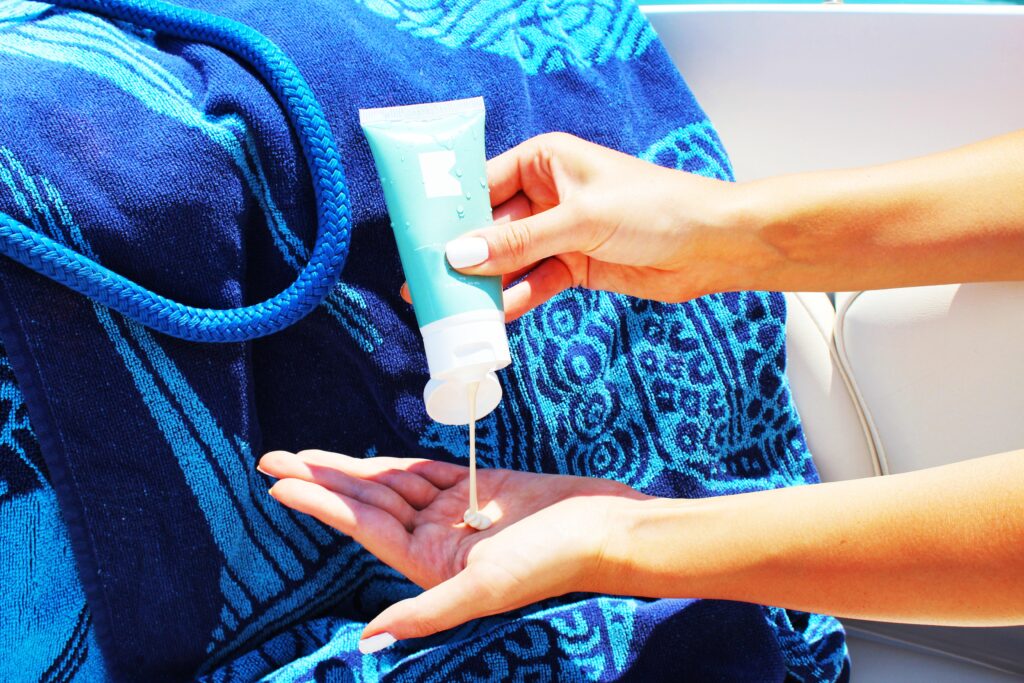It’s time to shield your skin from harmful UV rays with these sunscreen tips

by Stefanie Michaels
Sun protection is crucial for skincare and personal health, as exposure to the sun’s harmful ultraviolet (UV) rays can cause various skin problems, such as sunburn, premature aging, and an increased risk of skin cancer.
With the rise in global temperatures and the depletion of the ozone layer, it’s more important now than ever to take measures to protect your skin from the sun’s damaging effects.
Whether you’re spending a day at the beach or running errands, incorporating sun protection into your daily routine can help keep your skin healthy and radiant for years to come.

- Wide-brimmed hat: This is a classic sun protection item as it helps shade your face, neck, and ears from harmful UV rays.
- Sunglasses: Sunglasses protect your eyes from UV rays, which can cause cataracts, and blue light, which can contribute to digital eye strain and disrupted sleep patterns.
- Sunscreen: Sunscreen with a high SPF (sun protection factor) is essential for preventing skin damage and reducing the risk of skin cancer. Make sure to choose a broad-spectrum sunscreen that protects against UVA and UVB rays.
- UPF clothing: UPF stands for ultraviolet protection factor, which measures the amount of UV radiation penetrating a fabric. Wearing UPF clothing is easy to protect your skin from the sun without having to reapply sunscreen constantly.
- Long-sleeve shirts: Wearing long-sleeved shirts can protect your arms from harmful UV rays, especially if made from UPF fabric.
- Beach umbrellas or tents: If you plan on spending a lot of time at the beach, consider using a beach umbrella or tent to provide shade and protect yourself from the sun.
- Sun hats for kids: Children have sensitive skin and are more susceptible to sunburns, so protecting them from the sun is vital. A sun hat with a wide brim is a great option for keeping their face, neck, and ears covered.
- Lip balm with SPF: Your lips are also susceptible to sunburn and skin damage, so it is essential to protect them with a lip balm that contains SPF.
Did you know?
Sun protection is not just important during the summer months or when you are at the beach. UV rays can penetrate clouds and even glass, so protecting yourself from the sun all year round is important, no matter the weather or where you are.
It’s important to remember that you can still get sunburned on overcast days, so it’s best to be proactive about sun protection whenever you’re outside.
Another lesser-known fact is that UV rays can penetrate water, so protecting yourself while swimming or engaging in water activities is crucial. Water reflects and intensifies UV rays, so you can still get burned even if you’re not getting direct sun exposure.
It’s a good idea to wear a swim shirt and reapply sunscreen frequently if you’re spending a lot of time in the water.

A little history:
The history of sun protection dates back to ancient civilizations, where people used natural substances like olive oil, sandalwood, and lead powder to protect their skin from the sun.
In the early 20th century, the dangers of excessive sun exposure became more widely recognized, leading to the development of commercial sunscreens.
In the 1930s, a Swiss chemist named Franz Greiter developed the first modern sunscreen, Gletscher Crème, to protect his skin while climbing Mount Piz Buin in the Alps. The product was later commercialized and became popular among outdoor enthusiasts and beachgoers.
In the 1970s, concern about the damaging effects of the sun on the skin and the rise of skin cancer cases led to the introduction of SPF (sun protection factor) labeling. It increased awareness about the importance of sun protection.
Since then, sun protection has become a multi-billion dollar industry, with a wide range of products available to protect against UV rays, including sunscreens, UPF clothing, and sunglasses.
The science of sun protection has also advanced, with a greater understanding of the dangers of UV rays and the importance of broad-spectrum sunscreens that protect against both UVA and UVB rays.


